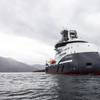The European Transport Council (i.e. the Transport Ministers of the European Member States), which
met in Brussels on March 25-26, has released from the European Community budget the 450 million
Euro necessary to launch the Galileo satellite navigation project. The Commission was asked to set
up the "Joint Undertaking" (the authority overseeing the management of Galileo's development phase)
without delay.
Galileo has been stalled for 15 months. At the Barcelona summit, European Leaders had approved its
launch and thus increased the pressure on the Transport Council. We understand that the agreement
was made possible by a compromise regarding the composition of the Joint Authority. In order to
avoid a conflict of interests, public companies (who will contribute significantly to the financing
of Galileo) will be excluded from the Joint undertaking until after completion of the tendering
process at the end of 2003.
Importantly for the shipping industry, Ministers stated in the Council Conclusions that Galileo
"should be interoperable with GPS and its successor systems through an EU-US agreement that should
be negotiated as soon as possible." Therefore, it would seem that those enterprises which wish to
continue using the free GPS system will be able to do so as the signal will not be blocked. In any
case, Galileo will have several levels of service, some of which will also be free. The European
Transport and Energy Commissioner, Mrs. Loyola de Palacio, has stated that there will only be a
charge for those services which are of a higher quality than GPS currently provides. It seems,
therefore, that the Galileo project will not necessarily entail extra expense for the shipping
industry unless it wishes to avail itself of the reportedly 'superior' capabilities of Galileo.
Featured videos

Inmarsat Enhances Service to Drive Digitalization

Inside the Electrified Truckable Tug

Tracking Foreign Vessels Working in the U.S. Jones Act Market
Subscribe for
Maritime Reporter E-News
Maritime Reporter E-News is the maritime industry's largest circulation and most authoritative ENews Service, delivered to your Email five times per week









